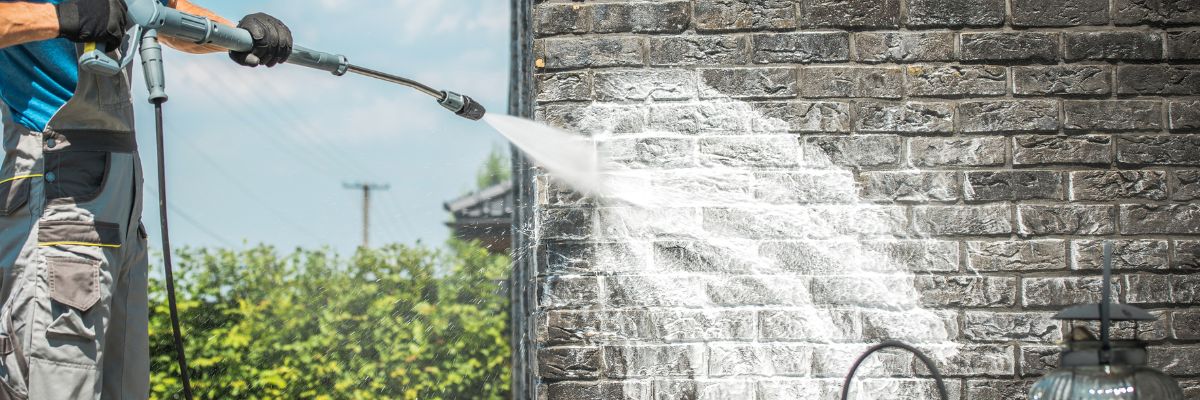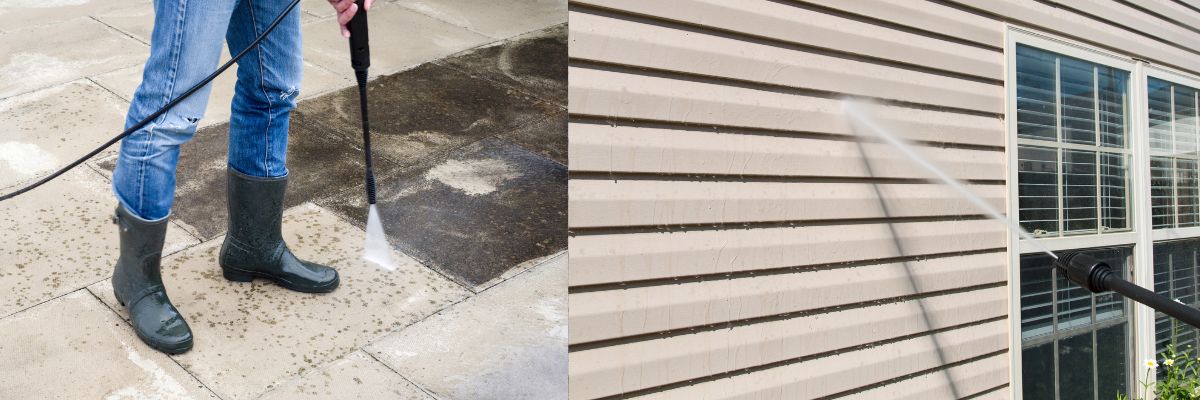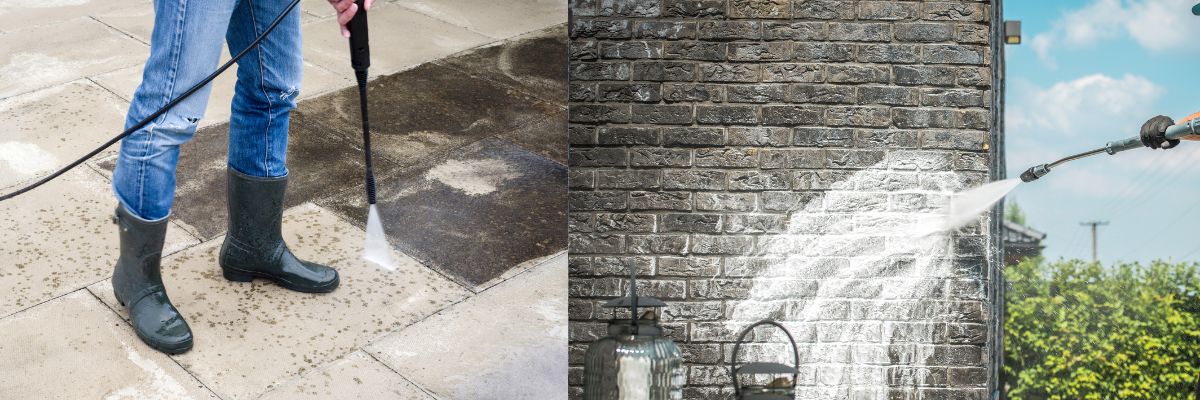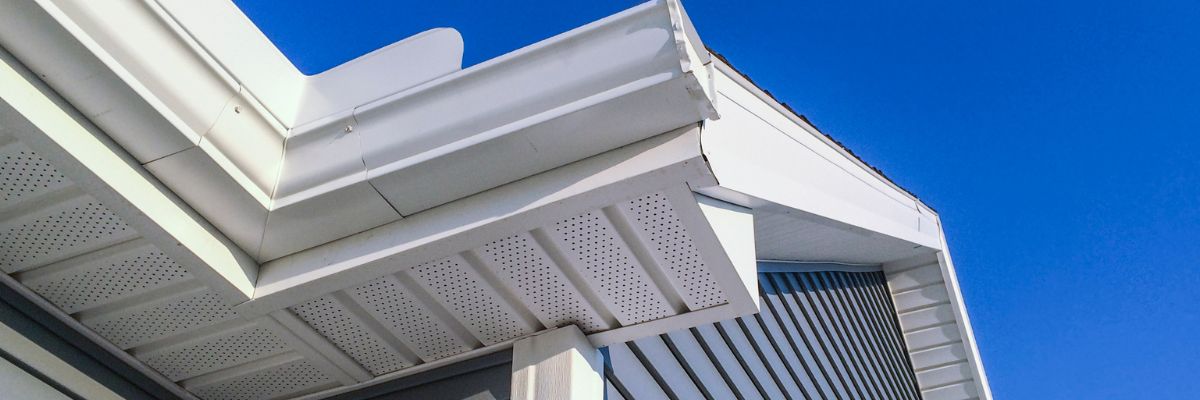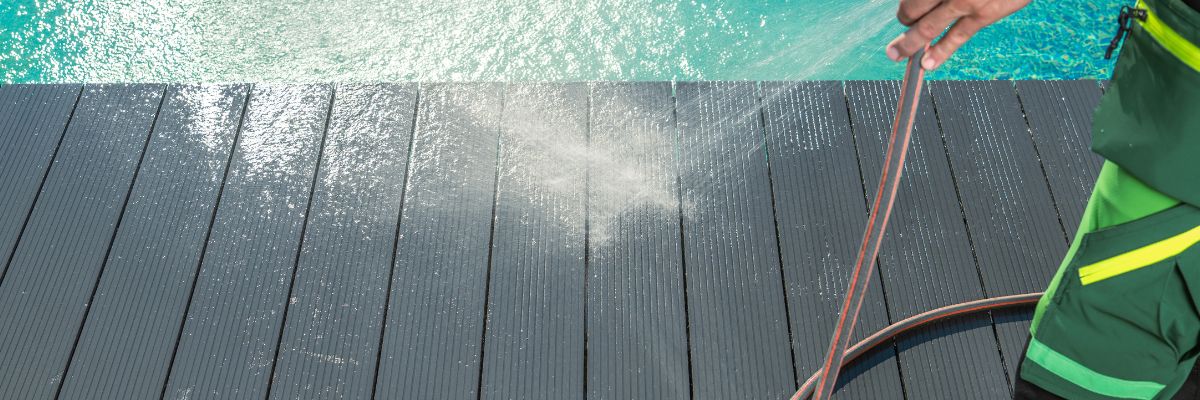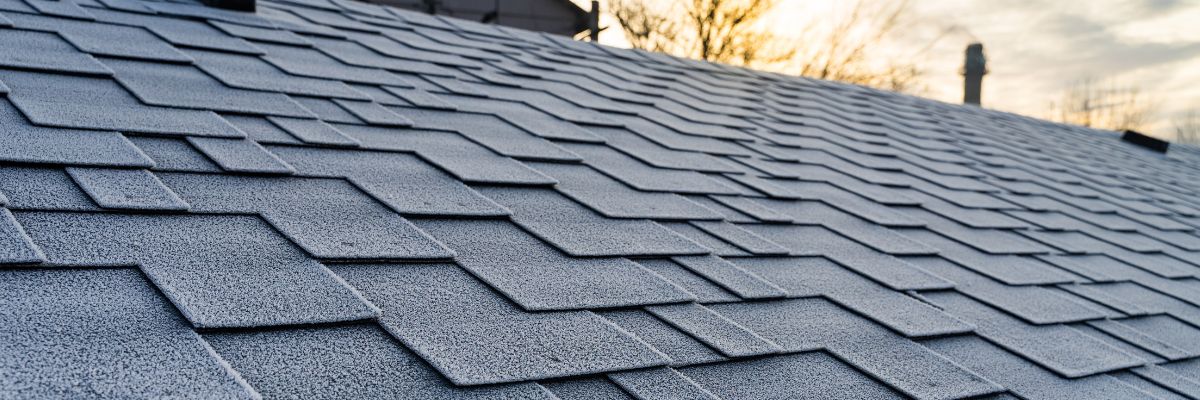The main difference between power washing and soft washing lies in the pressure and method used to clean surfaces.
Power washing uses high-pressure heated water to blast away tough grime from hard surfaces like concrete and brick.
Soft washing, on the other hand, relies on low-pressure water combined with specialized cleaning solutions to gently remove mold, algae, and dirt from delicate materials like roofs, siding, and wood without causing damage.
Keep reading to see if pressure washing or soft washing is right for you.
Core Differences Between Pressure Washing and Soft Washing
| Feature | Power Washing | Soft Washing |
|---|---|---|
| Water Pressure | High (1,500–4,400+ PSI) | Low (250–500 PSI) |
| Cleaning Method | Forceful water blasting | Low-pressure + chemical cleaning solutions |
| Best For | Hard surfaces (concrete, brick, stone) | Delicate surfaces (roofs, siding, wood) |
| Main Purpose | Remove tough stains, grease, grime | Kill mold, algae, mildew at the root |
| Risk Level | High (can damage surfaces) | Low (gentler on materials) |
| Water Usage | High | Lower |
| Chemical Use | Rare | Frequent (biodegradable cleaners) |
Pressure and Temperature
The most obvious difference lies in the pressure and temperature of the water. Pressure washing uses high-pressure water, to blast away dirt, grease, and grime. It’s a more aggressive method designed for tough stains and hard, durable surfaces.
Soft washing, on the other hand, operates at a much lower pressure—usually between 150 and 300 PSI—and relies on cold or mildly warm water, generally up to 140°F. Rather than pressure, it uses biodegradable chemical solutions to loosen and kill mold, mildew, and algae.
Cleaning Method
Pressure washing is primarily a mechanical process, using high-pressure jets to strip away contaminants. This makes it ideal for surfaces that can withstand force, like concrete, brick, and metal.
Soft washing is more of a chemical-based process, using low pressure to apply cleaning agents such as sodium hypochlorite (bleach) and surfactants. These chemicals break down organic matter, which is then rinsed away gently.
Surface Compatibility
Pressure washing should only be used on durable, non-porous surfaces that can handle high pressure. This includes driveways, sidewalks, patios, and industrial equipment.
Soft washing is specifically designed for delicate surfaces like roofs, vinyl siding, soffits, wood fencing, and composite decking, where high-pressure water could cause serious damage.
Applications of Each Method
Pressure Washing Applications
Pressure washing shines when it comes to cleaning surfaces that have deep, embedded grime or greasy buildup. It’s the go-to choice for:
- Oil-stained driveways
- Dirty sidewalks and patios
- Concrete parking lots
- Industrial surfaces and equipment
However, there are risks. Pressure washing can easily damage siding, roofing, painted wood, and composite materials, especially if used incorrectly or with too much pressure. In fact, it can void manufacturer warranties on many residential building materials if not done properly.
Soft Washing Applications
Soft washing is better suited for surfaces where organic growth—like algae, moss, and mildew—is the main concern. It’s the preferred method for:
- Shingle and tile roofs
- Vinyl or painted siding
- Wooden decks and fences
- Soffits, fascia, and trim
- TPO and other membrane roofing systems
By using chemical agents to kill mold at its root, soft washing provides longer-lasting results without compromising the material. This method is especially important in regions with high humidity, where mildew and algae are common problems.

Pressure Washing Vs Soft Washing: Pros & Cons
Pressure Washing: Pros and Cons
Pros:
- Fast and pressureful – Ideal for tackling grease and hardened grime.
- Efficient on non-porous surfaces like stone or metal.
- Great for prepping surfaces before sealing or painting.
Cons:
- High water consumption, using up to four times more water than soft washing.
- Risk of surface damage such as etching, paint stripping, or shingle loss.
- Not safe for soft or porous materials, often voiding warranties.
Soft Washing: Pros and Cons
Pros:
- Safe for delicate surfaces, including roofs and siding.
- Kills mold, mildew, and algae at the root for longer-lasting results.
- Uses less water and more eco-friendly cleaners.
Cons:
- Slower process, especially on heavy grime or grease.
- Requires careful chemical handling and proper safety measures.
- Effectiveness depends on dwell time—solutions must sit before rinsing.
When to Use Each Cleaning Method
Choose Pressure Washing For:
Pressure washing is appropriate for situations where intense physical removal of dirt and debris is necessary. Choose this method when you’re dealing with:
- Heavily stained concrete or stone
- Grease on driveways or garage floors
- Graffiti removal
- Preparation for paint or sealing on hard surfaces
It’s most effective in industrial or commercial settings, or when dealing with years of hardened buildup that won’t respond to soft washing alone.
Choose Soft Washing For:
Soft washing is best for residential exteriors and sensitive materials that can’t withstand high pressure. Use this method for:
- Roof cleaning, especially asphalt shingles or clay tiles
- Moss, algae, or lichen on siding or decks
- Routine home maintenance on wood, vinyl, or painted surfaces
- Cleaning delicate architectural details like trim, soffits, and gutters
Soft washing is also recommended for surfaces where mold or mildew is the primary concern, since the chemical solution helps eliminate growth at the root instead of just blasting it away.
Bottom Line: Choose the Right Method for the Job
Pressure washing uses high-pressure water to tackle tough stains on hard surfaces like concrete and brick, but that same force can easily damage siding, roofing, or wood. Soft washing, on the other hand, uses low pressure and cleaning solutions to gently remove mold, algae, and grime—making it the safer choice for most residential exteriors.
Choosing the wrong method can lead to costly repairs or even void warranties, so it’s important to understand what each surface requires. When in doubt, trust the professionals.
Vesta Pro Wash specializes in both pressure and soft washing techniques and knows exactly how to clean each surface safely and effectively. Let our experienced team protect your home while making it look its best—contact Vesta Pro Wash today for a free estimate!



